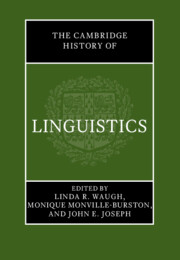Book contents
- The Cambridge History of Linguistics
- The Cambridge History of Linguistics
- Copyright page
- Dedication
- Contents
- Figures
- Tables
- Contributors
- Preface
- Acknowledgments
- Abbreviations, Acronyms, Special Symbols, and Other Conventions
- Introduction
- Part I Ancient, Classical, and Medieval Periods
- Part II Renaissance to Late Nineteenth Century
- Part III Late Nineteenth-through Twentieth-Century Linguistics
- Part IIIA Late Nineteenth Century through the 1950s: Synchrony, Autonomy, and Structuralism
- Part IIIB 1960–2000: Formalism, Cognitivism, Language Use and Function, Interdisciplinarity
- 17 Chomsky and the Turn to Syntax, Including Alternative Approaches to Syntax
- 18 Functionalist Dimensions of Grammatical and Discourse Analysis
- 19 Semantics and Pragmatics
- 20 Language and Philosophy, from Frege to the Present
- 21 Lexicology and Lexicography
- 22 Generative Phonology: its Origins, its Principles, and its Successors
- 23 Phonetics and Experimental Phonology, c. 1950–2000
- 24 Historical and Universal-Typological Linguistics
- 25 Language and Society
- 26 Language and Anthropology
- 27 Language and Psychology, 1950–Present: A Brief Overview
- 28 Semiotics
- 29 Applied Linguistics
- References
- Index
20 - Language and Philosophy, from Frege to the Present
from Part IIIB - 1960–2000: Formalism, Cognitivism, Language Use and Function, Interdisciplinarity
Published online by Cambridge University Press: 20 July 2023
- The Cambridge History of Linguistics
- The Cambridge History of Linguistics
- Copyright page
- Dedication
- Contents
- Figures
- Tables
- Contributors
- Preface
- Acknowledgments
- Abbreviations, Acronyms, Special Symbols, and Other Conventions
- Introduction
- Part I Ancient, Classical, and Medieval Periods
- Part II Renaissance to Late Nineteenth Century
- Part III Late Nineteenth-through Twentieth-Century Linguistics
- Part IIIA Late Nineteenth Century through the 1950s: Synchrony, Autonomy, and Structuralism
- Part IIIB 1960–2000: Formalism, Cognitivism, Language Use and Function, Interdisciplinarity
- 17 Chomsky and the Turn to Syntax, Including Alternative Approaches to Syntax
- 18 Functionalist Dimensions of Grammatical and Discourse Analysis
- 19 Semantics and Pragmatics
- 20 Language and Philosophy, from Frege to the Present
- 21 Lexicology and Lexicography
- 22 Generative Phonology: its Origins, its Principles, and its Successors
- 23 Phonetics and Experimental Phonology, c. 1950–2000
- 24 Historical and Universal-Typological Linguistics
- 25 Language and Society
- 26 Language and Anthropology
- 27 Language and Psychology, 1950–Present: A Brief Overview
- 28 Semiotics
- 29 Applied Linguistics
- References
- Index
Summary
This chapter, by four authors, traces the rise, development, critique, and demise of a diversity of theoretical stances in philosophy and linguistic meaning from 1880-2000, e.g.,
— modern logic, formal semantics, the linguistic turn in philosophy, truth-conditional semantics, intensional logic, possible world-semantics, categorial (Montague) grammar and ‘generalized quantifiers’;
— logical positivism and its critiques, ‘analytic’ statements, ‘radical interpretation’, ‘truth-theoretical semantics’, ‘proof-theoretical semantics’;
— psychological accounts of meaning, communitarian agreement; proper names as ‘rigid designators’; reference fixing vs. the properties of a ‘kind’ in all possible worlds;
— the ‘cognitive’ era: meaning as a property of mental states (’concepts’), the philosophy of mind, the naturalization program, intentional generalizations with a computationalist view, ‘narrow’ and ‘broad’ concepts of meaning, and the functions of informational structures.
— Speech Act Theory and pragmatics: ‘ordinary language philosophy’; performance in a context, felicity conditions, intentional and conventional aspects, communicative intentions, conventional meanings, the Cooperative principle, and inferences from conversational implicatures; presumption of rationality, ‘relevance theory’, combining pragmatics and a theory of mind; Discourse Analysis (Birmingham and Geneva School); enunciation theory; intersubjectivity; ‘polyphonic’ notion of subject, argumentative values, scales, and beliefs, Topoi Theory and the ‘theory of semantic blocks’.
Keywords
- Type
- Chapter
- Information
- The Cambridge History of Linguistics , pp. 656 - 681Publisher: Cambridge University PressPrint publication year: 2023

